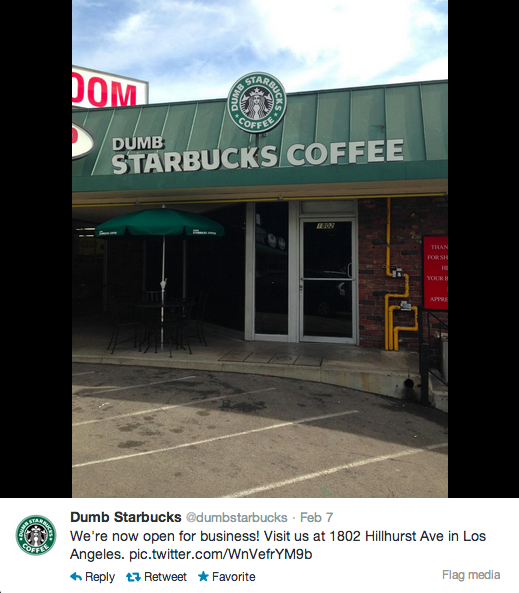The Legality of “Dumb Starbucks”
By now, pretty much everyone has heard about how Comedy Central star Nathan Fielder opened his personal version of a Starbucks in an L.A. strip mall. Fielder’s “Dumb Starbucks” looked just like a real Starbucks – same logos, colors, store layouts, and similar products and menu. With the exception that everything was preceded by the word “dumb”, including the “Dumb Blonde Roast” coffee and the “Dumb Norah Jones” CDs on sale by the register. Also, the coffee was free.
Fielder kept his involvement under wraps at first. But by Monday he revealed his ownership, and by Tuesday the L.A. County Board of Health had shut him down for operating without a license. And yet, while Dumb Starbucks lived, it created a sensation, with lines snaking down the street and Fielder invited onto Jimmy Kimmel to talk about his adventure.
Starbucks itself was not amused. “We are aware of this store, and it is not affiliated with Starbucks. We are evaluating next steps, and while we appreciate the humor, they cannot use our name, which is a protected trademark.” Starbucks spokeswoman Laurel Harper said in a statement. When pressed on whether Starbucks intends to take legal action, she replied, “That may happen. We’re not sure at this point.”
Fielder’s use of Starbucks’ trademarks, and his mimicking of the interior design of Starbucks’ shops (yes, distinctive interior designs can be trademarked as well) seems to give Starbucks ample opportunity to sue. But in recent years, courts deciding trademark cases have been gradually expanding the scope of fair use – that is, unauthorized uses of others’ trademarks that would otherwise be illegal, but are excused because they serve some overriding social purpose. In particular, judges have held that use in parodies – especially using a trademark in order to criticize the business that the trademark represents – are widely permitted.
A great example involves Louis Vuitton handbags. A pet products company named Haute Diggity Dog marketed a handbag-shaped “Chewy Vuiton” dog toy that mimicked LV’s famous marks. Louis Vuitton, which very aggressively enforces its trademarks, sued. But it lost – a federal court held that the Chewy Vuiton dog toy was a successful parody, one that was unlikely to fool consumers into believing that it was actually produced by or otherwise connected to Louis Vuitton.
Fielder is doing something similar here – sort of. As Fielder made clear both in the “FAQ” posted in the Dumb Starbucks shop and in this amusing video, Dumb Starbucks isn’t really a coffee shop – it’s a piece of conceptual art. And the concept has something to do with trademark law and the nature of parody.
The twist is that Fielder’s “parody” isn’t aimed primarily at Starbucks. Rather, it’s aimed at dumb parodies. Here’s a line from Fielder’s video that makes the point clearly: “By adding the word ‘dumb’ we are legally allowed to use the coveted name and logo, because we’ve fulfilled the minimum requirements to be considered a parody under U.S. law.”
Fielder is probably wrong about his parody defense. Since he is not really parodying Starbucks, but instead the idea of parodies, his defense is not that great and we wouldn’t bet on him winning on that ground. But that doesn’t mean Fielder should lose if Starbucks (unwisely, we think) decides to sue him.
Trademark law is fundamentally based on protecting consumers from being confused about the source of a product. Fielder’s Dumb Starbucks confused no one. For one, despite looking like a Starbucks in every way, literally everything had the word “dumb” appended to it —even the CDs for sale. In addition, Fielder did not take over an existing Starbucks and add “Dumb” to the signage; he used a formerly empty space. So no one headed to the local Starbucks, and by accident discovered Fielder’s art project. And of course the coffee was free — something that Starbucks as a rule does not do. Add in the fact that waits for coffee were well over an hour, and it is hard to imagine —especially in a savvy hipster neighborhood like Los Feliz — that anyone really thought they had wandered into a strangely-crowded and vandalized Starbucks.
It may be that Starbucks can claim that Fielder “tarnished” their brand, which is one other way of winning a trademark action. But it’s hard to see how Starbucks’ brand is really tarnished by what Fielder did. The typical tarnishment case involves the use of a trademark in a way that’s likely to saddle the mark with unsavory associations. But what Fielder has done with his Dumb Starbucks is a joke. And the only way Starbucks will be hurt by this is if it decides to sue rather than laugh.


Comments